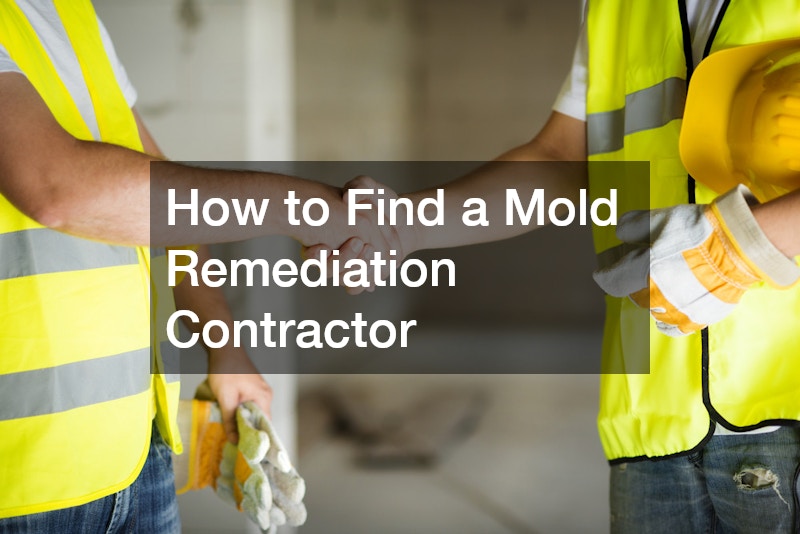
When you discover mold in your home or business, it can be alarming. Mold can cause significant damage to the structure of your property and pose serious health risks, especially for individuals with respiratory issues, allergies, or weakened immune systems. Mold remediation is a critical process to remove and eliminate mold from your property to restore it to a safe and healthy condition. But how do you find a reliable mold remediation contractor who will get the job done effectively?
In this article, we will walk you through the key steps to find a qualified mold remediation contractor, what to look for in a professional, and the critical questions you should ask during your search.
1. Understand the Role of a Mold Remediation Contractor
Before you start your search for a mold remediation contractor, it’s important to understand what this type of contractor does. A mold remediation contractor is responsible for inspecting your property for mold growth, identifying the source of the moisture that caused the mold, and removing the mold safely.
Their job involves not only eliminating visible mold but also addressing the underlying causes of mold growth, such as water damage or poor ventilation.
The process typically includes:
Assessing the extent of the mold problem: The contractor will perform a thorough inspection of your home or business to determine where the mold is located and how widespread the infestation is.
Containing the mold: In order to prevent the spread of spores during the remediation process, the contractor will contain the affected areas.
Removing the mold: The contractor will use specialized equipment and cleaning agents to remove the mold from surfaces and structures.
Repairing the source of moisture: A professional contractor will also work to repair the source of moisture to prevent future mold growth.
Knowing what to expect from a mold remediation contractor will help you make an informed decision when selecting a professional to handle your mold issue.
2. Do Your Research
The first step in finding a reputable mold remediation contractor is to do your research. Mold remediation requires specialized knowledge, training, and equipment, so it’s essential to find someone who has the proper experience and credentials.
Here are some ways to begin your search:
Ask for recommendations: Start by asking friends, family members, or colleagues if they have worked with any mold remediation contractors. Word of mouth is one of the most reliable ways to find trustworthy professionals.
Search online: Use online resources, such as Google or Yelp, to find contractors in your area. Look for contractors with positive reviews and high ratings. Many websites also allow users to leave feedback about their experience, which can help you gauge the professionalism and reliability of a contractor.
Check local directories: Local business directories, such as the Better Business Bureau (BBB), often have lists of certified mold remediation contractors in your area. These resources can provide useful information about a contractor’s reputation, licensing, and complaints (if any).
Verify certifications: Make sure the contractor holds certifications from recognized organizations like the Institute of Inspection, Cleaning, and Restoration Certification (IICRC) or the National Organization of Remediators and Mold Inspectors (NORMI). These certifications indicate that the contractor is trained and knowledgeable about industry standards and best practices for mold remediation.
3. Check Credentials and Experience
Once you’ve narrowed down your list of potential contractors, it’s time to dig deeper into their qualifications. Ask the contractor for the following information:
Licensing: Mold remediation contractors must be licensed in some states. Make sure the contractor you choose is properly licensed to perform remediation work in your area. While licensing requirements vary, having a licensed contractor ensures that they have met the necessary legal and professional standards.
Insurance: A good mold remediation contractor will carry general liability insurance to cover any damage that may occur during the remediation process. They should also have workers’ compensation insurance to cover their employees in case of an accident. Always ask to see proof of insurance before hiring a contractor.
Experience: It’s essential to choose a contractor with experience in mold remediation. The more experience they have, the better they’ll be at identifying potential problems and using the correct remediation methods. Ask the contractor how long they’ve been in business and about their previous experience with mold removal projects similar to yours.
4. Request a Written Estimate and Timeline
Before hiring a mold remediation contractor, be sure to get a written estimate for the work to be done. This estimate should include:
The scope of work: The estimate should outline the specific services the contractor will provide, including mold removal, containment procedures, and repairs.
Timeline: Ask the contractor how long the project will take. A reputable contractor should provide an estimated timeline for the completion of the work.
Pricing: Make sure the estimate includes a breakdown of costs for labor, materials, and other expenses. The price should also reflect any cleaning or disposal fees associated with the mold removal process.
Having a written estimate helps you avoid misunderstandings or unexpected costs down the line.
5. Ask About Safety and Protocols
Mold remediation can be a dangerous process, especially if the mold is toxic or the area is not properly contained. It’s essential to ask potential contractors about their safety protocols and how they will protect both themselves and your property during the remediation process.
Some important questions to ask include:
How do you contain the mold?: The contractor should have a system in place to prevent mold spores from spreading to other parts of your home or business.
What personal protective equipment (PPE) will you use?: Mold remediation requires PPE to keep workers safe from mold exposure. Ask the contractor what kind of protective gear they will wear, such as masks, gloves, and suits.
How will you dispose of the mold?: Proper disposal of contaminated materials is essential to avoid further contamination. Ask the contractor how they plan to handle mold disposal and whether they will follow local regulations for waste disposal.
6. Review the Contract
Once you’ve chosen a contractor, make sure to carefully review the contract before signing. The contract should outline the scope of work, the timeline, the cost, and any warranties or guarantees. Pay close attention to details such as:
Guarantees: Some contractors may offer warranties or guarantees on their work. Ask if the contractor provides any assurance that the mold will not return.
Payment terms: Be sure the payment terms are clearly stated in the contract. Avoid contractors who ask for large upfront payments—payment should be made upon completion of the work or in installments based on milestones.
7. Get a Second Opinion
If you’re unsure about a contractor’s estimate or approach, don’t hesitate to get a second opinion. Having multiple quotes can help you compare prices and ensure you’re getting a fair deal. It also allows you to evaluate how different contractors approach the remediation process.
Finding the right mold remediation contractor is essential to ensure that your property is properly cleaned and restored after a mold infestation. By doing thorough research, verifying credentials, asking the right questions, and getting multiple estimates, you can make an informed decision and hire a contractor who will get the job done right. Mold remediation is a serious undertaking, and having the right professional can help protect your home and health. Be sure to work with a licensed, experienced contractor who follows proper safety protocols and provides clear, transparent pricing.
